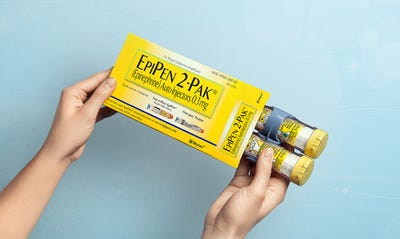EpiPen Maker Settles With DOJ for $465 Million
October 10, 2016
The company was accused of paying state Medicaid programs a generic rebate for brand-name product.
Nancy Crotti
 Mylan N.V. has agreed to pay the U.S. Department of Justice $465 million to settle charges that it overcharged the government for its EpiPen for several years.
Mylan N.V. has agreed to pay the U.S. Department of Justice $465 million to settle charges that it overcharged the government for its EpiPen for several years.
The news of a quick settlement with federal prosecutors sent Mylan's stock up nearly 9% in value on Monday, to about $39 per share. Mylan has been facing both congressional and public furor over the company hiking the price for the life-saving product more than sixfold since 2007.
When it comes to Medicaid programs, Mylan misclassified the drug-device combo as a generic product with the Centers for Medicare and Medicaid Services when it should have categorized it as a brand-name product, CMS acting administrator Andy Slavitt wrote in a letter to Congress last week. The difference shows up in the rebate that drug companies pay to Medicaid based upon the drug's classification. The rebate to state Medicaid programs for a generic drug is 13% of the average manufacturer price, according to CMS regulations. For a brand-name drug, a company pays a rebate of 23.1%.
Between 2011 and 2015, Medicaid spent $960 million on EpiPens before the rebate, according to Slavitt's letter. After the rebate, the agency spent $797 million, the Wall Street Journal noted. CMS did not say how much Mylan allegedly overcharged the program.
The EpiPen has been classified with CMS as a generic or "non-innovator" drug since before Mylan acquired the product in 2007 based on longstanding written guidance from the federal government, Mylan said in a statement. The company did not admit to any wrongdoing.
CMS said in a September statement it had "on multiple occasions, provided guidance to the industry and Mylan on the proper classification of drugs and has expressly advised Mylan that their classification of EpiPen for purposes of the Medicaid Drug Rebate program was incorrect."
Mylan also earned about 60% more on its EpiPen two-pack than the figure recently given to Congress, according to a document filed with the Securities and Exchange Commission. The Wall Street Journal pointed out the discrepancy between the $100-per-pack profit figure that Mylan CEO Heather Bresch gave the House Government Oversight Committee and the actual profit of $166. The difference came from the 37.5% U.S. corporate tax rate that Mylan's SEC filing claimed it paid on each pack, which lists for $608. That tax rate was five times more than Mylan paid last year, the Journal noted.
Mylan announced in August that it would reduce the patient cost of the device from $600 to $300 through the use of a reusable coupon.
Nancy Crotti is a contributor to Qmed.
Like what you're reading? Subscribe to our daily e-newsletter.
[Image courtesy of Mylan]
About the Author(s)
You May Also Like


